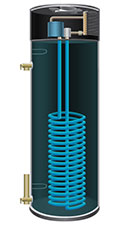Buying a Heat Pump with Winter in Mind
Heat pumps are the most efficient way to heat or cool a home electrically in moderate climates. In fact, the operating cost of heat pumps can be as low as a quarter of what other comparable heating and cooling systems cost.
This efficiency is why so many Maryland and D.C. residents choose heat pumps as their source of heating and cooling. These systems generally do well in this temperate climate with the exception of the occasional bone-chilling day.
Generally when the outside temperature reaches below freezing, there is not enough warmth for the heat pump to work effectively and the emergency heat is turned on. Heat pumps contain an electric resistance heater for emergency heat when it is unable to run at full capacity. This form of heating a home is very expensive and can drastically increase your electric bill.
This year we’ve seen that Climate Change means extreme cold weather, too. With visits from the Polar Vortex, our Mid-Atlantic region does not have the mild winter it once did. Some homeowners may be thinking about turning in their heat pumps for a more robust heating system. Before ruling out the heat pump as a contender, here are a few module variations that can keep you warm all winter long without a large electric bill:
Scroll Compressors

Not all heat pump models are created equally. Scroll compressor heat pumps have a greater capacity to warm a home compared to piston compressors, the more common air source model. Scroll compressors can heat a home up to an extra 10° to 15°F more without using the expensive emergency heat.
Back-up Burners
In addition to the electric resistance heaters that come standard in heat pumps, a burner can also be used as a back up for heating. The burner can run on propane, natural gas, or oil. Operating on these fuels is cheaper than using the standard electric resistance heater and uses less electricity.
ENERGY STAR Certified
Choosing an ENERGY STAR certified heat pump might be one of your best options. ENERGY STAR heat pumps are 9% more efficient than the average heat pump on the market, and are 20% more efficient than the heat pump the average home is using. But most important for those of you wanting to avoid the cold and high bills, ENERGY STAR appliances also have a higher heating seasonal performance factor (HSPF), the measurement used to rate the heat pump’s efficiency at heating.
References:








